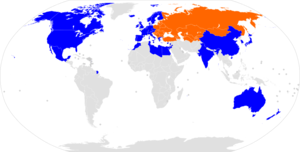European Bank for Reconstruction and Development
The European Bank for Reconstruction and Development (EBRD) is a financial institution founded in January 1990 with the aim of favoring the transition to a market economy and promoting private initiative in the ex-communist countries of Eastern Europe.
It was inaugurated in April 1991 in London, where its headquarters are located. The inauguration ceremony was attended by 41 government representatives corresponding to the members that were initially part of this institution: Australia, Canada, South Korea, Egypt, the states of the European Union, the United States, Israel, Japan, Morocco, Mexico and New Zealand.
The European Investment Bank and the European Commission also participate, both representing the European Union.
The bank provides financing to banks, companies and public administrations. It also collaborates with public companies to support their privatization and restructuring. According to the bank's statutes, it only collaborates with democratic countries; In addition, it must promote sustainable development.
EBRD Presidents
The presidents of the EBRD have been:
- April 1991 - June 1993: Jacques Attali (French)
- September 1993 - January 1998: Jacques de Larosière (French)
- September 1998 - April 2000: Horst Köhler (German)
- July 2000 - July 2008: Jean Lemierre (French)
- July 2008 - 2012: Thomas Mirow (German)
- Suma Chakrabarti (2012 - 2020)
- Odile Renaud-Basso (2020 - present)
Shareholders
Criticism
Various NGOs have criticized the EBRD for its lack of progress on its core mission, the "transition to an open and democratic market economy".
Projects harmful to the environment
Some NGOs have criticized the EBRD for financing projects that they consider harmful to the environment and society. Although in recent years it has increased its investments in energy efficiency and sustainable energy, these NGOs believe that the bank continues to reduce the impacts of green investments by financing carbon-intensive developments such as coal, oil and gas production, transportation and generation, highways and airports. Among the challenged projects are the Ombla Power Station in Croatia, the Kumtor gold mine in Kyrgyzstan, and the Šoštanj lignite mine in Slovenia.
The Balkans
EBRD's activities in the Balkans have aroused particular controversy and criticism, especially when they have focused on national parks or free-flowing rivers. This has often involved the actual or proposed construction of hydroelectric dams and road infrastructure. Indeed, a 2017 report denounced deficiencies in monitoring and mitigation measures that had been designed to lessen the environmental impact of EBRD-funded dam projects, while, in March 2018, outdoor clothing brand Patagonia helped launch The Dam Truth campaign, which directly calls on international banks, including the EBRD, to "stop investing in the destruction of Europes last wild rivers".
In 2011, the EBRD approved a €65 million loan to ELEM, the Macedonian electricity company, for the construction of a dam at the Boškov Most hydroelectric power station. The Standing Committee of the Berne Convention requested the immediate suspension of the project, in reference to the high biodiversity of the area and its importance as a central breeding area for the Balkan lynx, one of the most endangered mammals on the planet. In January 2017, the bank canceled the loan on the grounds that "the conditions for disbursement were not met".
Back in North Macedonia, the EBRD was criticized by environmentalists after plans were announced to divide the Galičica National Park into the UNESCO Ohrid-Prespa Transboundary Biosphere Reserve with an A3 expressway, which would have forced the reduction of certain protection zones of the national park. Scientists from North Macedonia and elsewhere signed a statement in opposition to this and other proposed projects for the Ohrid-Prespa region, a message that was reinforced by a joint reactive monitoring mission from the World Heritage Center, ICOMOS and the IUCN, which requested the full cancellation of the proposed A3 road sections. This recommendation was underlined by the World Heritage Committee at its 41st session in Kraków. Finally, in February 2018, the Republic of North Macedonia abandoned plans for the road, redirecting EBRD funds to other infrastructure projects.
2014 sanctions against Russia
The EBRD announced on 23 July 2014 that it would suspend new investment projects in Russia, following an earlier statement by the European Council. The statement by the European Council was made in the context of the 2014 pro-Russian riots in Ukraine. As of 2014 Russia has been the largest recipient of funds of all countries. In 2013, the Russian Federation received €1.8 billion for investment from the EBRD and €1 billion from the EIB. Russia used the funds to finance various projects, including pipeline valves, property acquisitions and a loan to a hypermarket chain. Two Russian projects were pending financing from the EBRD: a €300 million scheme to promote energy efficiency and a US$180 million loan for the leasing of agricultural and forestry equipment. The bank stated that it will continue to manage the projects ongoing in Russia. Despite denying Russia new funds, the EBRD continues to insist on its 6.1% stake in the Moscow Stock Exchange, seeking benefits from Russia with the privatization of the Soviet economy.
Projects harmful to the environment
Some NGOs have criticized the EBRD for financing projects that they consider harmful to the environment and society. Although in recent years it has increased its investments in energy efficiency and sustainable energy, these NGOs believe that the bank continues to reduce the impacts of green investments by financing carbon-intensive developments such as coal, oil and gas production, transportation, and generation, highways and airports. Among the challenged projects are the Ombla Power Station in Croatia, the Kumtor gold mine in Kyrgyzstan, and the Šoštanj lignite mine in Slovenia.
Contenido relacionado
International Monetary Fund
Saints
Tax
